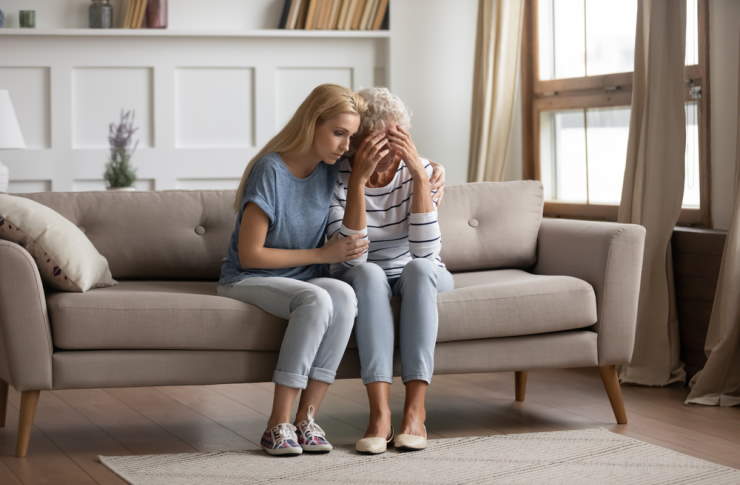4 Tips to Prevent Depression in Your Aging Parents
Depression can strike at any age. The elderly are no exception. But what can you do to keep your aging parents away from depression?

Depression affects 15 to 25% of seniors. There are many reasons for this: disabling illness, loneliness, family problems, social difficulties, the onset of neurological pathology, etc.
Identifying the Depression
The first difficulty for the family and friends is to detect a depressive tendency. However, depression manifests itself in many ways in the elderly. The most frequent complaints concern the body and its deterioration, but other symptoms are not necessarily associable with a state of sadness. Some signs can give the alarm: sleep and eating disorders, unexplained fatigue, imaginary illnesses, agitation, anxiety, jealousy, or feelings of persecution.
Isolation is the leading cause of low moods!
The top cause of low morale among seniors is (not surprisingly) isolation and the weakening of their social fabric. Widowhood is a frequent cause of depression. It becomes a challenge to manage the garden or the house and to cook good meals when you no longer share them with someone else. The bonds with loved ones can relax, and loneliness increases the discomfort.
What can you do to fight against isolation?
Think about spending time with your aging parents! They have a lot to contribute, especially with children, it would be a shame to deprive yourself of this. The child/senior relationship is very beneficial and rewarding for both parties. Do you live far away from your parents? A study published by researchers at Oregon Health & Science University shows that using tools like Skype helped reduce depression in older people. And a message or a phone call is always welcome.
A normal physiological slowdown
The needs of older people are different, an obvious fact that many families find difficult to accept.
Being less active and focusing on oneself is normal. It is important to respect this physiological slowdown. Several conditions may improve with a combination of common sense and treatment, which you should not hesitate to try. However, it is important to assess whether depression is a gateway to dementia.
4 Tips to Keep Your Aging Parents Away from Depression
Feeling useful
All losses of autonomy are moments of fragility. The aging person must be able to continue to feel useful and supported. Maintaining one’s memory, learning to look good again, being helpful to others are all areas that the elderly must regain.
But also to transmit knowledge of which the person is the only holder. It can be elements of genealogy, his testimony on a past time, recipes, tips. The list is long.
Helping without assisting
The goodwill of the relatives is not always enough, and many praiseworthy intentions fall through if the proposed support is not suitable. The elderly often see their desires dwindle, their interests fade away, their curiosity fade. As the circle around them shrinks, repetition sets in, and their lives seem duller and duller.
At this stage, it is vital to know how to avoid certain traps: the expression of fatigue, which often masks boredom and a feeling of emptiness in relationships, will be taken at face value by someone close to the person concerned, who will then do everything in their place in order to relieve the grandparent. As the latter no longer has any projects or achievements to make, the depression increases.
It can translate into criticisms or demands of those in charge of everything. Misunderstanding develops, causing conflict or hidden anger.
Provide Relays
At the same time, one must not forget oneself and do too much. “Helping the caregivers” is a principle that all medical and social workers know because we know that sacrifices have their limits. In particular, if the rewards in return are minimal.
The kids should not hesitate to count on their circle of relations to take over and to plan turns for the aging parent and to rely on existing services: home help, temporary housing, rehabilitators, or physiotherapists, all of whom can stimulate the interest of the senior person.
Moving away to get closer
Taking time off, leisure activities, and time for oneself allows for a better conviviality, a better exchange when returning to the parent. There are new things to share. The distance enables you to recharge the energy you sometimes need to deploy for two. And it is a law of nature: pleasure attracts pleasure!
Below are prevention steps that might be helpful:
- Join neighborhood associations to maintain an active social life.
- Practice sports activities according to their health condition.
- Daily exposure to sunlight.
- Go on outings while visiting them.
- Not change the way you talk to them.
- Do not be too directive (you should stop complaining.)
- Be patient and practice attentive listening (don’t interrupt them, allow them to express their feelings, don’t be impatient.)
- Being supported and surrounded by family and friends is essential.
- To consult a doctor to assess the state of their health.
Get help from professionals, especially home care professionals, who can break the isolation and strengthen social bonds.
Life and its difficulties or illnesses can cause the most fragile elderly to become depressed. In particular, if the loss of autonomy makes them feel useless. In order to prevent it, in most cases, three factors contribute significantly: the senior, the family members, both social and medical services.




